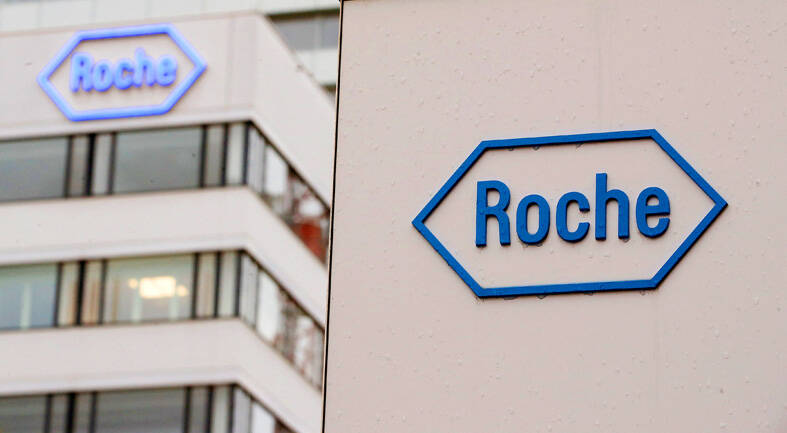Roche Holding AG has agreed to buy Carmot Therapeutics Inc, the developer of a new kind of weight-loss treatment that is the hottest commodity in the pharmaceutical industry, in a deal that could eventually push the Swiss drugmaker into competition with European rival Novo Nordisk A/S.
Roche agreed to pay as much as US$3.1 billion for three clinical-stage assets in obesity and diabetes, with an initial payment of US$2.7 billion and additional milestones of up to US$400 million, the company said in a statement on Monday.
Although Carmot’s drugs are still in the early stages of development, the deal could lead to a competitor to the likes of Novo Nordisk’s Wegovy and Eli Lilly & Co’s Zepbound, which are fueling the growth of a weight-loss market estimated to reach US$100 billion by the end of the decade.

Photo: Reuters
Roche is joining a race by global pharmaceutical giants to get into that business, with Pfizer Inc also developing a new weight-loss drug and AstraZeneca PLC signing a licensing deal with Chinese drug developer Eccogene Inc (誠益生物) for a pill to treat obesity.
Among Carmot’s financial backers is Horizons Ventures Ltd (維港投資), the private investment arm of tycoon Li Ka-shing (李嘉誠), Hong Kong’s richest person, the Bloomberg Billionaires Index shows.
Carmot’s lead asset is a treatment for obesity in patients with and without Type-2 diabetes. Injected subcutaneously once per week, it has potential as a standalone and combination therapy to improve weight loss and be expanded to other indications, Roche said.
Upon closing the deal, Roche would obtain all of Berkeley, California-based Carmot’s clinical and preclinical assets. The transaction is expected to close in the first quarter of next year.

WEAKER ACTIVITY: The sharpest deterioration was seen in the electronics and optical components sector, with the production index falling 13.2 points to 44.5 Taiwan’s manufacturing sector last month contracted for a second consecutive month, with the purchasing managers’ index (PMI) slipping to 48, reflecting ongoing caution over trade uncertainties, the Chung-Hua Institution for Economic Research (CIER, 中華經濟研究院) said yesterday. The decline reflects growing caution among companies amid uncertainty surrounding US tariffs, semiconductor duties and automotive import levies, and it is also likely linked to fading front-loading activity, CIER president Lien Hsien-ming (連賢明) said. “Some clients have started shifting orders to Southeast Asian countries where tariff regimes are already clear,” Lien told a news conference. Firms across the supply chain are also lowering stock levels to mitigate

IN THE AIR: While most companies said they were committed to North American operations, some added that production and costs would depend on the outcome of a US trade probe Leading local contract electronics makers Wistron Corp (緯創), Quanta Computer Inc (廣達), Inventec Corp (英業達) and Compal Electronics Inc (仁寶) are to maintain their North American expansion plans, despite Washington’s 20 percent tariff on Taiwanese goods. Wistron said it has long maintained a presence in the US, while distributing production across Taiwan, North America, Southeast Asia and Europe. The company is in talks with customers to align capacity with their site preferences, a company official told the Taipei Times by telephone on Friday. The company is still in talks with clients over who would bear the tariff costs, with the outcome pending further

Six Taiwanese companies, including contract chipmaker Taiwan Semiconductor Manufacturing Co (TSMC, 台積電), made the 2025 Fortune Global 500 list of the world’s largest firms by revenue. In a report published by New York-based Fortune magazine on Tuesday, Hon Hai Precision Industry Co (鴻海精密), also known as Foxconn Technology Group (富士康科技集團), ranked highest among Taiwanese firms, placing 28th with revenue of US$213.69 billion. Up 60 spots from last year, TSMC rose to No. 126 with US$90.16 billion in revenue, followed by Quanta Computer Inc (廣達) at 348th, Pegatron Corp (和碩) at 461st, CPC Corp, Taiwan (台灣中油) at 494th and Wistron Corp (緯創) at

NEGOTIATIONS: Semiconductors play an outsized role in Taiwan’s industrial and economic development and are a major driver of the Taiwan-US trade imbalance With US President Donald Trump threatening to impose tariffs on semiconductors, Taiwan is expected to face a significant challenge, as information and communications technology (ICT) products account for more than 70 percent of its exports to the US, Chung-Hua Institution for Economic Research (CIER, 中華經濟研究院) president Lien Hsien-ming (連賢明) said on Friday. Compared with other countries, semiconductors play a disproportionately large role in Taiwan’s industrial and economic development, Lien said. As the sixth-largest contributor to the US trade deficit, Taiwan recorded a US$73.9 billion trade surplus with the US last year — up from US$47.8 billion in 2023 — driven by strong